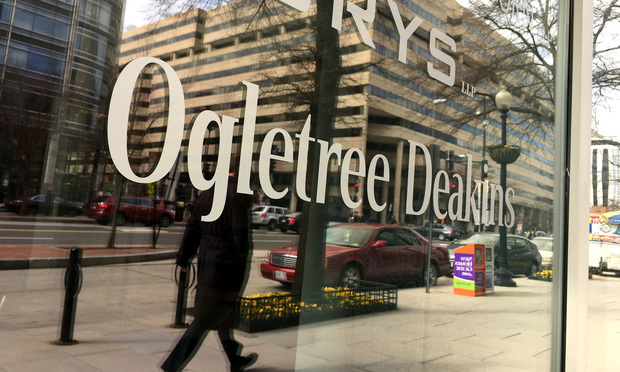Ogletree, Ex-Partner in Gender Bias Case Spar Over Arbitration Pact
Dawn Knepper, a former nonequity shareholder at Ogletree, argues that the firm shouldn't be able to invoke an arbitration agreement in light of several flaws. Ogletree, meanwhile, argues Knepper knew plenty about the agreement when it took effect.
October 03, 2018 at 04:05 PM
5 minute read

Ogletree, Deakins, Nash, Smoak & Stewart and Dawn Knepper, a former nonequity shareholder who has accused the firm of gender bias, have traded new blows in a battle about whether her claims belong in arbitration.
Through her lawyers at Sanford Heisler Sharp, Knepper argued Tuesday in a San Francisco federal court filing that an Ogletree employee arbitration agreement should be disregarded, despite the firm's claims that the pact applies to her case. Among other arguments, Knepper said she never signed such an agreement and that the firm's first notice about the agreement came in an email sent in the early morning before a holiday weekend.
“Ogletree disseminated a neutral and misleadingly-titled email to its employees, with a proposed arbitration agreement attached. The firm's communications about the transaction were ambiguous and inadequate to put employees on notice that failing to act would waive their rights,” wrote Knepper's lawyers at Sanford Heisler Sharp, a firm that has taken a lead role in a series of gender discrimination suits against large law firms. “Yet, it now claims that plaintiff Knepper's silence in response to its offer binds her to the agreement's terms.”
Tuesday's brief from Knepper comes in opposition to an Ogletree filing in late August that requested the case be transferred to Southern California in light of a provision in the arbitration agreement. In its August filing, the firm argued that Knepper is bound by an arbitration agreement in light of a January 2016 email that the firm circulated internally.
The two sides dispute what impact that email, and Knepper's alleged response, should have on the gender bias case, which alleges that the labor and employment specialty firm operates under a male-dominated hierarchy that short-changes women on pay and promotions.
Ogletree has denied the allegations of discrimination and has said in statements that its compensation system is fair and equitable. The firm has also announced steps taken internally that, Ogletree said, are designed to promote equity.
The suit itself began in January as a proposed class and collective action. Knepper, now practicing law at Buchalter, was later joined by other named plaintiffs, including former Ogletree equity shareholder Tracy Warren, who also landed at Buchalter.
 Dawn Knepper
Dawn KnepperThe recent dispute over the arbitration agreement, however, relates specifically to Knepper—as a former equity shareholder, Warren is bound by a separate shareholder management agreement, while the other plaintiffs are based outside of California and, therefore, their claims belong in other states, according to the firm.
Ogletree has maintained that the January 2016 email provided details on a policy requiring employees to arbitrate disputes they have with the firm. It says that the email put Knepper on clear notice about the arbitration agreement and how to opt out. The email went to all firm staff, including nonequity shareholders and other lawyers, but did not go to equity shareholders in light of their separate shareholder agreement.
Along with the arbitration pact, Ogletree explained in its email that the agreement would become mutually binding on both the firm and individual employees if they continued working there and if they failed to opt out within six weeks, according to the firm's August court filing. The firm further argued that Knepper, specifically, received a number of notifications about the agreement. Ogletree also said an “email read” receipt backs up the argument that Knepper saw the original email and that she later responded to an email from a firm administrator about the agreement on March 1, 2016—the deadline to opt out of the arbitration agreement.
“Cases show that Ogletree's implementation of the agreement was sound. Courts regularly find an arbitration agreement binding even where an unsophisticated employee-plaintiff had not signed the form acknowledging receipt of an opt-out provision,” the firm, represented by a team led by Paul Hastings's Nancy Abell, wrote on Aug. 29. “As a seasoned employment attorney, Knepper cannot credibly argue that she did not understand the agreement or its opt-out instructions.”
Knepper, meanwhile, maintains that she never signed the agreement and has no recollection of receiving the January 2016 email or of sending the March 1, 2016, response that Ogletree points to as evidence that she knew about the agreement. Despite Ogletree's experience in crafting such arbitration pacts for its clients, the agreement itself and the firm's communications about it with employees were flawed and should render it unenforceable, Knepper argued.
“Ogletree seeks to characterize two ambiguous documents (an email read receipt and a one-line email from plaintiff) as indisputable evidence that she assented to its confusingly-worded arbitration contract. But this falls far short of the evidence necessary to carry Ogletree's burden,” Knepper's lawyers wrote.
Read More:
Women Exit Ogletree Deakins in Wake of Gender Bias Allegations
Ogletree Deakins, Troutman Sanders Bolster SoCal Labor Law Teams
This content has been archived. It is available through our partners, LexisNexis® and Bloomberg Law.
To view this content, please continue to their sites.
Not a Lexis Subscriber?
Subscribe Now
Not a Bloomberg Law Subscriber?
Subscribe Now
NOT FOR REPRINT
© 2025 ALM Global, LLC, All Rights Reserved. Request academic re-use from www.copyright.com. All other uses, submit a request to [email protected]. For more information visit Asset & Logo Licensing.
You Might Like
View All
'Ridiculously Busy': Several Law Firms Position Themselves as Go-To Experts on Trump’s Executive Orders
5 minute read
Holland & Knight Hires Former Davis Wright Tremaine Managing Partner in Seattle
3 minute read
Am Law 200 Firms Announce Wave of D.C. Hires in White-Collar, Antitrust, Litigation Practices
3 minute read
Paul Hastings Hires Music Industry Practice Chair From Willkie in Los Angeles
Trending Stories
Who Got The Work
J. Brugh Lower of Gibbons has entered an appearance for industrial equipment supplier Devco Corporation in a pending trademark infringement lawsuit. The suit, accusing the defendant of selling knock-off Graco products, was filed Dec. 18 in New Jersey District Court by Rivkin Radler on behalf of Graco Inc. and Graco Minnesota. The case, assigned to U.S. District Judge Zahid N. Quraishi, is 3:24-cv-11294, Graco Inc. et al v. Devco Corporation.
Who Got The Work
Rebecca Maller-Stein and Kent A. Yalowitz of Arnold & Porter Kaye Scholer have entered their appearances for Hanaco Venture Capital and its executives, Lior Prosor and David Frankel, in a pending securities lawsuit. The action, filed on Dec. 24 in New York Southern District Court by Zell, Aron & Co. on behalf of Goldeneye Advisors, accuses the defendants of negligently and fraudulently managing the plaintiff's $1 million investment. The case, assigned to U.S. District Judge Vernon S. Broderick, is 1:24-cv-09918, Goldeneye Advisors, LLC v. Hanaco Venture Capital, Ltd. et al.
Who Got The Work
Attorneys from A&O Shearman has stepped in as defense counsel for Toronto-Dominion Bank and other defendants in a pending securities class action. The suit, filed Dec. 11 in New York Southern District Court by Bleichmar Fonti & Auld, accuses the defendants of concealing the bank's 'pervasive' deficiencies in regards to its compliance with the Bank Secrecy Act and the quality of its anti-money laundering controls. The case, assigned to U.S. District Judge Arun Subramanian, is 1:24-cv-09445, Gonzalez v. The Toronto-Dominion Bank et al.
Who Got The Work
Crown Castle International, a Pennsylvania company providing shared communications infrastructure, has turned to Luke D. Wolf of Gordon Rees Scully Mansukhani to fend off a pending breach-of-contract lawsuit. The court action, filed Nov. 25 in Michigan Eastern District Court by Hooper Hathaway PC on behalf of The Town Residences LLC, accuses Crown Castle of failing to transfer approximately $30,000 in utility payments from T-Mobile in breach of a roof-top lease and assignment agreement. The case, assigned to U.S. District Judge Susan K. Declercq, is 2:24-cv-13131, The Town Residences LLC v. T-Mobile US, Inc. et al.
Who Got The Work
Wilfred P. Coronato and Daniel M. Schwartz of McCarter & English have stepped in as defense counsel to Electrolux Home Products Inc. in a pending product liability lawsuit. The court action, filed Nov. 26 in New York Eastern District Court by Poulos Lopiccolo PC and Nagel Rice LLP on behalf of David Stern, alleges that the defendant's refrigerators’ drawers and shelving repeatedly break and fall apart within months after purchase. The case, assigned to U.S. District Judge Joan M. Azrack, is 2:24-cv-08204, Stern v. Electrolux Home Products, Inc.
Featured Firms
Law Offices of Gary Martin Hays & Associates, P.C.
(470) 294-1674
Law Offices of Mark E. Salomone
(857) 444-6468
Smith & Hassler
(713) 739-1250










